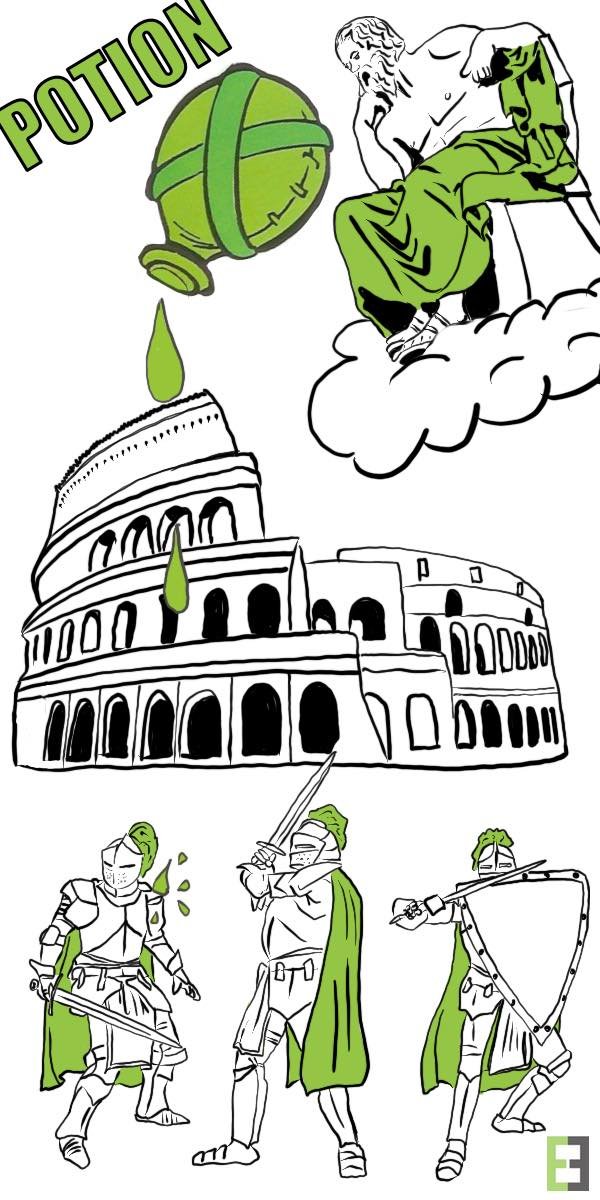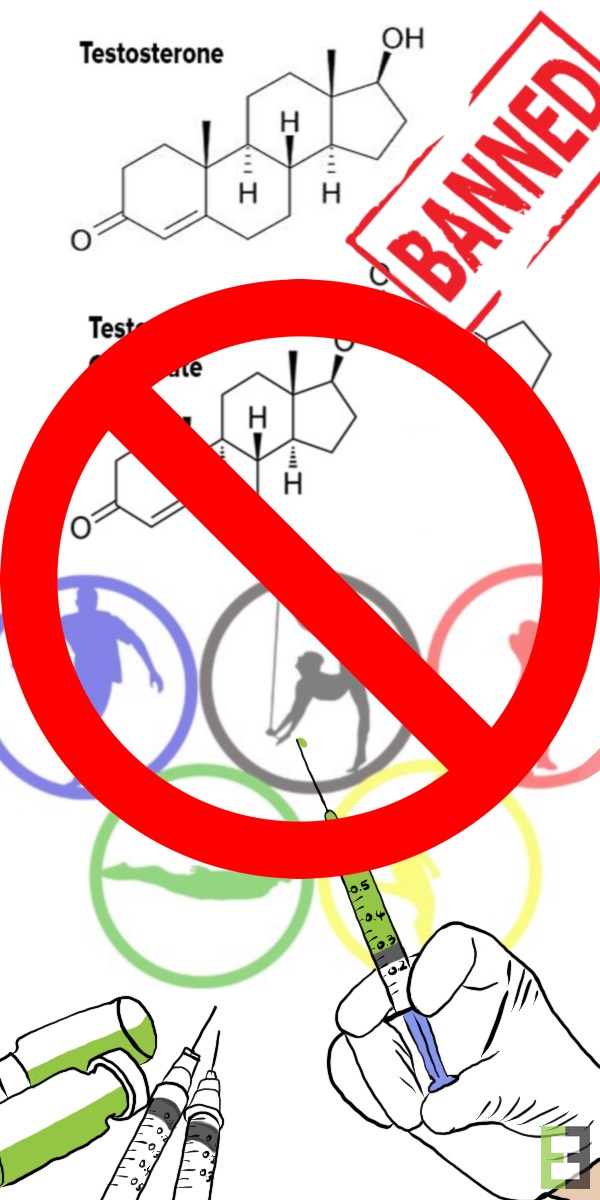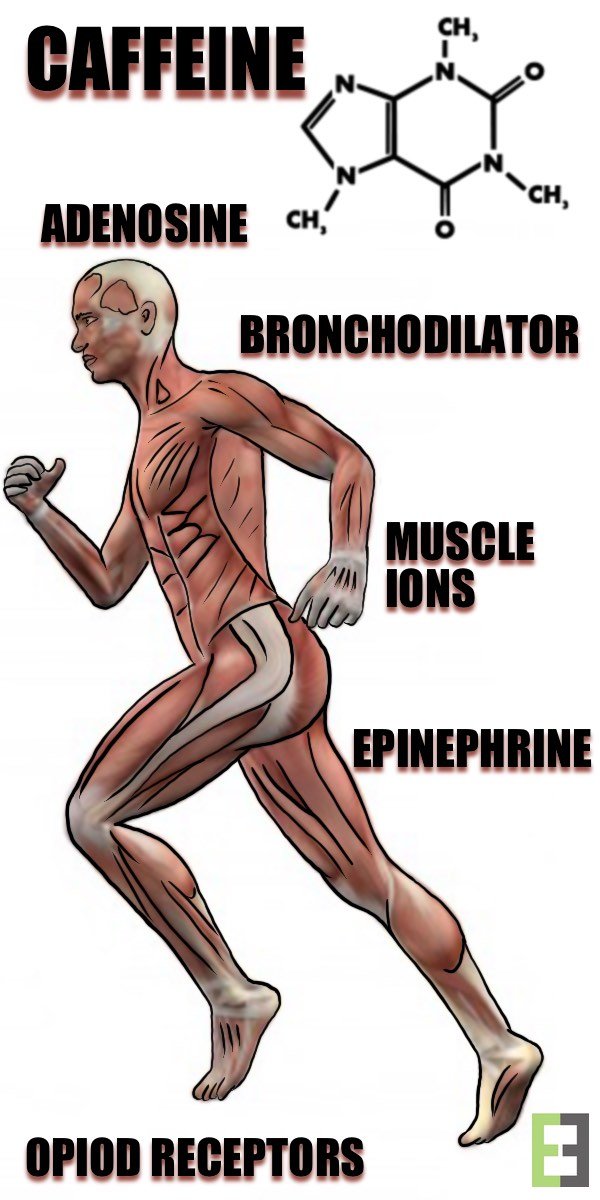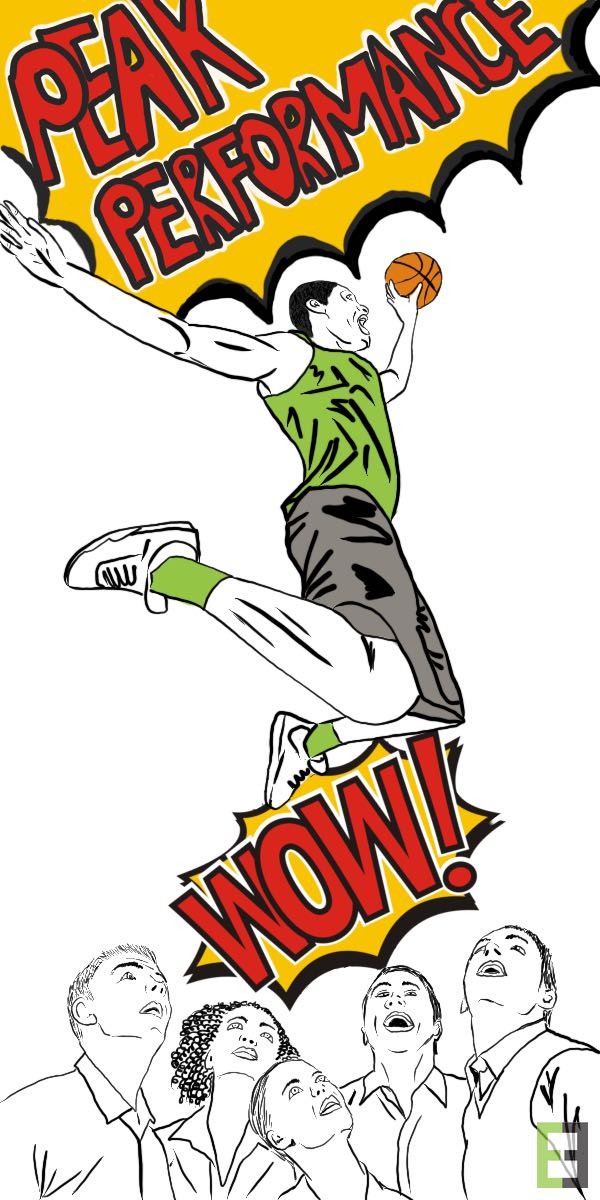The Effects of Caffeine on Sports Performance

Ever wondered why your morning 'Cup of Joe' helps to get the day started? How about its potential effects on your athletic performance? This post will answer both these questions and more.

The use of stimulants, as performance enhancers, is not a recent occurrence.
The ancient Greeks, Romans and Medieval Knights used substances to gain an edge over their enemies on the battlefield. These ergogenic aids ranged from; sesame seed mixtures, brandy, and wine concoctions, to hallucinogenic mushrooms [10].
Nowadays, Caffeine (CAF) is the most widely used 'stimulating' substance on the planet [1]. The mass adoption of CAF is attributed to the many foods and beverages which contain it.
Some examples, of these consumables, are Coffee, Tea, chocolate, sodas, and candy [1].
CAF's relationship to sports:
Just like the ancient warriors, sportspersons have also looked for the edge over their fellow competitors. The use of these ergogenic aids, in sport, saw a massive spike over the last 40 years.
The diversity of substances has also grown to include anabolic hormones, selective androgen receptor modulators, and beta-2 agonists, among others.

The need to regulate the use of Performance Enhancing Drugs (PED's) became strikingly apparent, thus, the World Anti-Doping Agency (WADA) was founded on November 10, 1999 [3].
The purpose of this governing body is to maintain an ethical and fair environment for all competitive sports, worldwide [3].
Every year WADA evaluate and review all the know PED's and decide which ones to ban or allow in competition. CAF was deemed, a banned substance in competitive sport, by WADA, before 2004 [5]
WADA now permits CAF usage in competitive games, but, have included the drug in their ‘monitoring program,’ for 2018 [3].
CAF's effect on the body:
Caffeine is thought to up-regulate five different biological mechanisms, all of which enhance performance: [1]
Increase the availability of bio-active forms of calcium around the muscle. This mineral helps with the contractility of the fibers.
Increase the oxidation of Free Fatty Acids (FFA’s), which is said to preserve muscle fuel (glycogen) stores from being depleted.

CAF antagonizes the adenosine receptors.
Over the course of the day adenosine, is supposed to, naturally, accumulate in the brain. When this chemical reaches a high enough level, the brain senses a type of ‘sleep pressure.’ By blocking this sleep signal, CAF can artificially provide a sense of alertness, to the user [4].CAF also stimulates the bodies production of epinephrine, an adrenaline hormone, responsible for the fight or flight response [1].
Over and above CAF’s ability to interact with the central nervous system, the chemical also acts on the bodies opioid receptors, giving it the ability to reduce pain and inflammation.
These qualities have made CAF a popular additive in many pain and flu, over the counter, medications [1].
It is also important to mention that the liver metabolizes caffeine into three dimethyl xanthines, namely Paraxanthine, theobromine, and theophylline [4]. Theophylline relaxes the soft tissues of the lungs and acts as a bronchodilator[5][6].
It is for this reason that theophylline is used by asthmatic patients who suffer with, low level, chronic inflammation, of the airways.
These 'actions' would be desirable for performance in sport, but, CAF contains too little theophylline, per dose, to give the desired effect.
CAF's relationship to Sports Performance:

It was long believed that CAF lowers the bodies Respiratory Exchange Ratio (RER) to favor fat oxidation. This shift in metabolism was said to spare glycogen stores, which, in-turn, improves endurance potential.
Despite many direct and indirect testings of this theory, over the past few years, no definitive conclusion has been made [1][9].
Most studies, however, attribute CAF ergogenic effects to the enhanced ionic environment which it provides to skeletal muscle [9].
The increase in 'available calcium' allows for more muscular contractions, sustained over an extended period.
These stimulating effects, however, target the slow-twitch muscle fibers as opposed to their fast-twitch counterparts.
The enhanced effect on type I(slow-twitch) muscle tissue, make CAF a strong candidate as an ergogenic aid for endurance athletes [7]. These findings were verified, through a literature review on 21 studies, by [2], who found that CAF, on average, showed a 3.3 +/- 4.3% improvement in athletes endurance.
Two studies, as cited in [1], found that CAF also had favorable effects on power output in cyclists and speed among swimmers. These findings co-inside with another review article [9], where the authors state how CAF improves, power output, speed, endurance, but, not strength in athletes.
Over and above the enhanced muscle contractile qualities, the authors, [5] believe that CAF's most significant ergogenic quality is through it's 'numbing effect.'
By increasing an athletes pain threshold, they can maintain their level of exercise for longer.
All in all, there is a lot of evidence of CAF’s efficacy as an ergogenic aid, especially in endurance sports. There are however many factors such as, mode of delivery, timing, habituation, dose, and testing protocol which can impact the results [2].
Follow @exercisinghealth
Bibliography:
[1]Graham T. Caffeine and Exercise. Sports Medicine. 2001;31(11): 785-807.
[2]Ganio M, Klau J, Casa D, Armstrong L, Maresh C. Effect of Caffeine in Sports specific Endurance Performance: A systematic Review. National Strength and Conditioning Association. 2009;23(1):315-323.
[3]What is Prohibited [Internet]. World Anti-Doping Agency. 2018 [cited 5 February 2018]. Available from: https://www.wada-ama.org/en/content/ what-is-prohibited/prohibited-in-com
[4]Ribeiro J, Sebastião A. Caffeine and Adenosine. Journal of Alzheimer's Disease. 2010;20(s1):S3-S15.
[5]Klimesova I, Machova I, Jakubec A, Corkle J. Effect of caffeine on maximal oxygen uptake in wheelchair rugby players: A randomized, placebo-controlled, double-blind study. Acta Gymnica. 2017;.
[6]Yang A, Palmer A, de Wit H. Genetics of caffeine consumption and responses to caffeine. Psychopharmacology. 2010;211(3):245-257.
[7]Mitsumoto H, DeBoer G, Bunge G, Andrish J, Tetzlaff J, Cruse R. Fiber- Type Specific Caffeine Sensitivities in Normal Human Skinned Muscle Fibers. Anesthesiology. 1990;72(1):50-54.
[8]LeBlanc J, Jobin M, Cote J, Samson P, Labrie A. Enhanced metabolic response to caffeine in exercise-trained human subjects. Journal of Applied Physiology. 1985;59(3):832-837.
[9]Graham T. Caffeine and Exercise. Sports Medicine. 2001;31(11): 785-807.
[10]Yesalis C, bahrke M. History of doping in sport. International Sports Studies. 2002;24(1):42-45.
*All images were created by @exercisinghealth
Being A SteemStem Member
Me gusto esta informacion, excelente ya vote, sigueme
Thank you! please don't comment yourself on the top. I will upvote you, if i want you there. It is unfair for everyone else who commented too!
Cool stuff. I didn't know caffeine was considered a performance enhancing drug in some aspects. Congrats on getting featured in SteemSTEM Distilled.
Thank you, super happy to get featured there!
Yup, it is the most widely used stimulant. Caffeine was even used during war times, to keep soldiers awake during night watch.
Thanks for your support!
Interesting article! I admit I started reading it, expecting it to say "caffeine is bad for you! It might help you temporarily but destroy you in the future!" But it seems like it is a more or less safe way to get an edge in some sports...
I also hadn't much thought about ancient warriors also consuming the kind of edible that would alter them and make them more ferocious... that would be interesting to read more about
Thanks for your comment!
There are always two sides to a coin. I think it is important to see both of them. Caffeine definitely has its downsides. I do, however, feel it can be very beneficial during sport when taken infrequently.
Yup, I was surprised and intrigued too. I guess performance for them was life or death. You would try anything at that point.
Came here from steemSTEM distilled, congrats.
I did knew about the adenosine thing, but did not know it has role in endurance of athletes too. Is it for short term only or has similar effects on long term use?i suspect it has some negative health effects on prolonged use.
Probably the most common negative effect is the development of dependence on caffeine. Which is why even though there have been few studies that show about 2 cups of coffee a day has cardiovascular benefits (can't find the links, not even sure if the studies were done by proper medical research teams) I prefer to keep myself down to a max of one cup per day with no coffee every 2-3 days. Helped me alot to avoid getting dependent.
Yeah, I guessed the same. I couldn't find Any proper research article with solid evidence about it. Thanks for the info man :).
The body builds up a tolerance to CAF relatively quickly. For this reason, the rule of thumb is to use it infrequently.
I used to participate in competitive sport. I would often have restless nights before an event. On those 'game' days, CAF used to really help me. I do believe that if I had consumed the stimulant every day, however, the benefits would have been less.
Great article, did you know that caffeine is the most widely used stimulant in the world. I know I enjoy a cup of coffee before my morning run.But I stay away from those "energy drinks". Those tend to dehydrate my body and cause craps. Then I find myself drinking pickle juice to keep from cramping up.
I drink way to many energy drinks.
Thank you!
I too, love my morning brew. I've also gotten into matcha tea... I try and keep the caffeine consumption, strictly in the morning. The stimulating effects, keep me up at night, otherwise.
Through my research, many studies found that caffeine does not, in fact, dehydrate the body. I believe it is a myth.
Very informative, the bibliography at the end makes it professional :)
Thank you! I am glad you enjoyed the post. You can pick up an old magazine and read a bunch of pie in the sky information. @exercisinghealth is, however, a research-based blog. We try and provide the most accurate health information available which is backed by science.
The use of stimulants in sports is not ideal. athletes who use banned substances gain an unfair advantage over hard working athletes which is not good for the life of sports
Caffeine is not a banned substance. WADA approve this drug for use in all sports and competitions. Personally, I also wish performance-enhancing drugs never existed... Unfortunately, they do though. I wrote a very controversial article on this subject, check it out: https://steemit.com/steemstem/@exercisinghealth/should-certain-drugs-be-used-in-some-sport
performance enhancers are a night mare to sports
i used when i worked out green tea instead of coffee as it has it's natural caffeine too!
I have gotten into matcha tea lately, its basically a powdered form of green tea. Have you tried it?
no, not yet i have heard it ofc but it was plain green tea or biological tea that i harvested myself from the mountain of my village or a mix of green tea with other herbals. Is matcha tea that good from what you experienced?
Nothing better than picking wild herbs from the mountains. Whenever I go to my dads village, I do the same.
I haven’t researched the health benefits of matcha. I do however love the taste. Asian people have been drinking the stuff for ages.
all natural is the wayy
I agree with you! It is close to impossible to live 'all natural' these days though. We can, however, try our best!
Tried it many times just before hard runs and races. Unfortunately has no effect on me, apart from giving me a dodgy stomach, haha. Even tried strong tea. I Just stick to water now, oh, and lots of sleep.
Caffeine effects everyone differently.
Sleep is crucial for recovery. I believe that rest, is the number 1 most overlooked tool for performance.